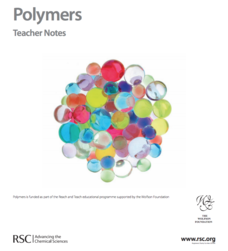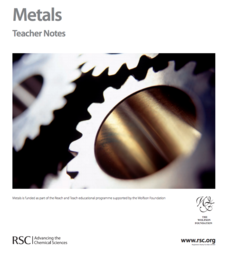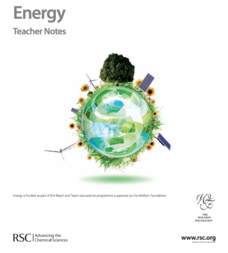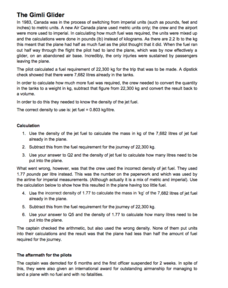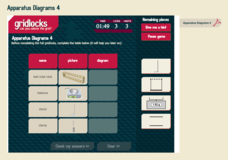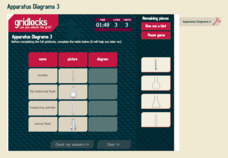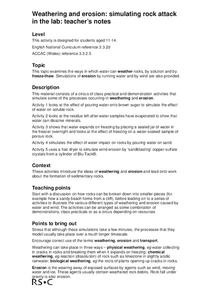Royal Society of Chemistry
Polymers—Gifted and Talented Chemistry
Polymers are an important part of our day-to-day lives, but how much do your pupils know about them? Learn the basics and beyond in a series of activities designed to build skills in observation, planning, organic chemistry, and bonding.
Royal Society of Chemistry
Metals—Gifted and Talented Chemistry
Malleable, magnetic, mesmerizing metals! Pupils love learning about metallic elements, especially through the hands-on activities in an engaging lesson plan. The resource provides thorough instruction on the properties of metals, the...
Royal Society of Chemistry
Energy—Gifted and Talented Chemistry
What has more energy than a room full of pupils after a fire drill? This lesson plan! Explore the changes in energy during different chemical reactions, discover why some reactions feel cold and others feel hot, and tackle the concept of...
Royal Society of Chemistry
The 400m Event—Chemistry and Sport
How do Olympic runners succeed in physically demanding events like the 400-meter dash? Physiology scholars explore the relationship between acids, bases, and the muscular system through a scenario-driven activity. The lesson focuses on...
Royal Society of Chemistry
Gimli Glider—Anecdotes for Chemistry Teachers
What's the moral of this story? Units save lives! Teach measurement conversion through storytelling in a quick math-based lesson. Young scientists learn how one country's decision to swap from imperial to metric standard units caused an...
Royal Society of Chemistry
Extraction of Copper
Is copper found as a raw material? Science sleuths manipulate the reactants and products found in the copper extraction process in a series of fun puzzles. The interactive engages learners in pairing formulas with their names while using...
Royal Society of Chemistry
Common Compounds
Can your young chemists identify the most commonly used chemicals in the lab? Introduce the class to the go-to substances in most middle and high school chemistry experiments with an interactive. The resource offers timely feedback as...
Royal Society of Chemistry
Apparatus Diagrams 4
Lab tools are cool! But, which one is the right tool for the job? Young scientists participate in a series of puzzles focused around some common lab equipment. Each puzzle requires learners to associate the tool with its image and a...
Royal Society of Chemistry
Apparatus Diagrams 3
Glassware everywhere! How do you help scholars learn to identify the different types of laboratory glassware? Introduce them to some of the main tools of the trade through interactive puzzles. Users match and manipulate items based on...
Royal Society of Chemistry
Apparatus Diagrams 2
Ready to heat things up in the lab, but your class doesn't know its way around a Bunsen burner? Scholars get familiar with heating apparatuses through a series of puzzles designed to promote vocabulary and reasoning skills. The activity...
Royal Society of Chemistry
Apparatus Diagrams 1
One of the biggest challenges for beginning scientists is figuring out the names of the equipment! Introduce your chemistry class to essential lab apparatuses using a series of related games. Pupils pair images of a test tube, funnel,...
Royal Society of Chemistry
Alloys
What are alloys, and why do we use them? Through a series of interactive puzzles, scholars examine the components and uses of several common alloys. The accompanying teacher's resources provide support in using the lesson, printable...
Royal Society of Chemistry
Alkalis and Salts
Gamification is an educational sensation! Young scientists build their acid-base vocabulary skills through a series of puzzles focused on bases and the salts they form. The challenging activity comes complete with a printable version and...
Royal Society of Chemistry
Acids and Salts
How well do your young chemists know their acid-base reactions? Reinforce neutralization reaction and problem-solving skills with a challenging interactive. Learners examine the reactants, then predict the outcome in a series of...
Royal Society of Chemistry
Acids and Alkalis
Is your acid-base chemistry lesson plan a little ho-hum? Spice things up with puzzles! Young chemists manipulate facts about acids and bases to solve a series of interactive puzzles. The activity combines content knowledge and...
Royal Society of Chemistry
Hazard Symbols
Starting in 2015, all chemicals must have a pictogram of the associated chemical hazards. A brain-building activity reviews four of the basic symbols found in a typical science laboratory. Through a fun puzzle, scholars apply their...
Royal Society of Chemistry
Elements 4
Don't miss the silver lining when you are looking for gold. A brain-bending interactive allows scholars to sharpen their puzzle skills while reviewing chemical elements, including silver and gold. First, pupils match 12 chemical elements...
Royal Society of Chemistry
Aspirin—The Wonder of Medicine
What do aspirin and the willow tree have in common? Scholars of chemical synthesis engage in a fascinating reaction to make their own aspirin samples. The lab uses thin layer chromatography analysis, includes stoichiometric calculations,...
Royal Society of Chemistry
A Microscale Acid-Base Titration
Watch as acids and bases put smiles on their faces. Young chemists learn the concept of acid-base titration firsthand in a microscale experiment. Working groups collaborate, titrate, then use their data to determine the concentration of...
Royal Society of Chemistry
Investigating Temperature Changes on Evaporating Liquids—Microscale Chemistry
Is there more to evaporation than just less liquid? Show young scientists the energy transformation that occurs during a phase change through a series of simple experiments. Lab partners place drops of water, ethanol, and ethoxyethane on...
Royal Society of Chemistry
Weathering and Erosion: Simulating Rock Attack in the Lab
Into each life some rain must fall, but how can that change rocks? Young geologists' understanding of weathering and erosion increases throughout the activities. The lesson includes five short activities to be completed over two class days.
Royal Society of Chemistry
Separating Mixtures: How We Concentrate Natural Materials
Have your class look at a granite specimen and describe what they see. They should note three distinct components. Discuss mixtures with them and how they might be separated, then send them to the lab to figure out how to take apart five...


